I used to write up my own Oscar list every year, and added some screenwriting notes to challenge writers… Until I realized that people only wanted to know if they should see the movie or not. So I gave recommendations each year until I stopped finding years of movies worth talking about.
But fortunately, 2019 turned out to be a decent year for entertainment. Sure, Game of Thrones choked in its final season, but many other great streaming shows dominated conversations this year. My fav is Mindhunter on Netflix.
For features, while many gabbed about the foreign film Parasite as the best picture, I maintained for six months that Yimou Zhang’s Shadow was the best… Until I discovered it came out in 2018!
Still, it’s also important to recognize that despite Avengers: Endgame being overlooked by Oscar, the single most important movie moment in 2019 remains:

That snap is the culmination of 10 years of what Scorsese calls theme park movies that have almost single-handedly kept Hollywood alive with $$ billions in box office receipts.
But for those of us who think that Oscar got it wrong yet again (and I do), here’s my rundown for 2019.
The Best
Ford v Ferrari
When Ferrari humiliates Ford Motors in a business deal, Ford hires two racers to build a supercar to win Le Mans, 1966.
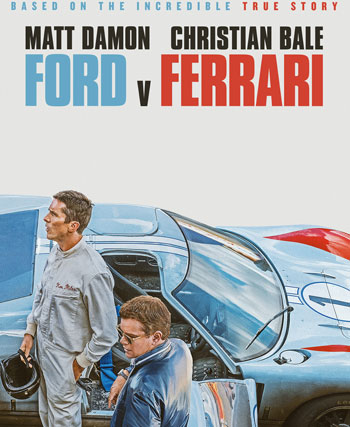
With NO buzz, perhaps because it “stays in its lane” (pun intended). That is, it doesn’t break new cinematic ground. It’s a traditional, straight forward story that sets up multiple levels of conflict and pays off a clear specific goal.
Carrol Shelby (Matt Damon) and Ken Miles (Christian Bale) are thoroughly entertaining as the quibbling friends determined to balance Ford’s bureaucratic interests and their personal desires to accomplish the near-impossible task.
Honestly, it could have been longer. I’d love to see more of Shelby’s personal life, more of Miles’ marriage, but at 152 minutes, the movie is pitch-perfect, exciting and fun for the whole family. See it.
Richard Jewell
When GA passed the fetal heartbeat bill, Hollywood (well, a few rabid actors) declared they would no longer film in GA. So, Clint Eastwood announced he was filming his next film there: the true story of Richard Jewell, an oddball wannabe cop who becomes a hero discovering a bomb at the 1996 Olympics… until the FBI (deep state) and (fake news) media falsely suspect he’s the terrorist and try to destroy his life.
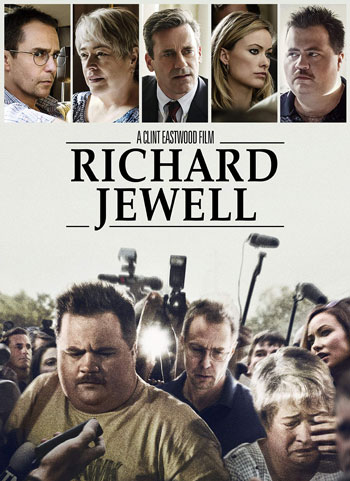
The most prescient movie of the year was totally overlooked because it was too close to reality. No, not the Richard Jewell case or abortion debate. It’s too close to the anti-Trump impeachment-happy leftists who never accepted the results of the 2016 election.
Sorry, but there’s no other reason. This is one of Clint’s best films, and he rightly excoriates the deep state and media. See it.
Structured like Sully and Flight, Act 1 lays out the extraordinary event, Act 2 creates controversy, and Act 3 pays off the emotion that defines the hero’s noble character.
Richard Jewell delivers on all levels. We sympathize with his predicament, understand how the FBI and media went wrong, and rage against the ultimate injustice they put him through.
The movie includes not only an outstanding performance from Paul Walter Hauser as Jewell, but Kathy Bates as the mother and the always watchable Sam Rockwell as his lawyer.
Once Upon a Time in Hollywood
Imagine if Quentin Tarantino tried to make a Robert Altman film. Here it is! Toughguy stuntman and his struggling TV actor ramble through the masculine-softening Hollywood until they collide with the Manson family in 1969.
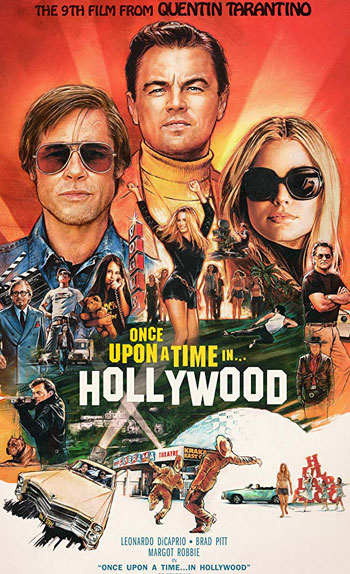
The story runs on theme. Hollywood (and perhaps our society) is unfortunately feminizing. Sharon Tate picks a 12-year-old looking Roman Polanski (Steve McQueen didn’t stand a chance), and dances through parties and theaters at will while rugged stars like Rick Dalton (Leonardo DiCaprio) struggle to find lead roles.
After years of awesome roles, Dalton doubts himself and his agent wants him to do Italian westerns. He’s got to step up just to keep up with a plucky, fearless 8-year old girl on set.
Meanwhile, unfocused former war hero stuntman Cliff Booth (Brad Pitt) fixes stuff, feeds his dog, gets kicked off the set for fighting Bruce Lee, and becomes the center of good in the story by refusing the sexual advances of a leggy hippy.
Then he returns her to the Manson ranch, creating one of the best tension-filled sequences of the year.
The movie ends in a laugh-riot re-imagining of Helter Skelter, an ending we never dared ask for because we know we can’t get it in this life. That creates a catharsis worth the trip, even if two-thirds of the way through the movie you’re still wondering what the movie is about.
Little Women
I’m told this movie isn’t for me so I can’t have an opinion.
Well, with all due respect, Greta Gerwig’s version of the classic and frequently told tale is excellent. She’s able to create strong and sustained interpersonal conflict between Jo (Saoirse Ronan) and Amy (Florence Pugh) and uses a modern “unreliable narrator” with editing to convey meanings lost in other versions. See it.

However, I will still take it to task for its tacked-on anachronistic theme. Greta’s preaching a disparaging “marriage is an economic decision” second-wave feminist thing, completely forgetting that our characters live in the 1860’s. There’s no social safety net, neighborhood policing, employment equality, or social media management jobs for failed authors.
This is not to say that all 19th-century “spinsters” starved, but even if God doesn’t send Jo a blessed husband in His good time, “taking a man’s name and my children will belong to him” would be a small price to pay to stay out of the crime and horse-dung teeming slums of New York!
Other versions of Jo focused on her personal morality (Katharine Hepburn), being worthy of her father’s (and heavenly Father’s) trust. Or it’s her unspecified angst (the 1994 Winona Ryder version is a kitten-stuffed companion to Reality Bites) but she still actually settled down with the foreign teacher (a Latino in this version instead of a German).
All to say, this version’s Jo has 1960’s atheist socialist feminist opinions, which ignores the character’s reality and the modern audience’s needs. Do we really need an anti-marriage theme in today’s crumbling marriage culture?
Perhaps Laurie and Frederick should have MGTOW attitudes to give Jo a run for her money! But we’ll let that go. Theme is a minor thing, right?
The Rest
Parasite
A “parasite” family cons its way into full employment with a rich family and fights another parasite couple.
Yes, it won Best Picture Oscar, but it doesn’t deserve it. Many people are still trying to infer some deeper meanings — layers within the class stuff, the rich and poor, the honor of fathers, and all that. Just stop. It’s not there.
It started very well. By 40 minutes in, I actually thought I was watching best picture.
This family develops a funny and clever con to become fully employed by a rich family. The son is the protagonist, who takes the first risk pretending to be an English teacher. He seizes the opportunity to bring the sister in, and even coaches his father how to run the con.
Add to that, he begins a romantic relationship with the rich family’s daughter even though his friend plans to return for her.
We think it’s a variation on farce: our hero (and family) enters an arena and find they have to go through an overstuffed mechanism of chaos in order to get out.
That’s a solid setup.
But then the midpoint reveals two big problems:
- The rich family is NOT a mechanism of chaos. Sure they’re gullible, but they’re normal, nice, fair and reasonable. They include the parasites as members of the extended family. That’s a huge problem because the writer hasn’t developed an inherent conflict that would cause this parasitic family to change.
- So the writer invents a new conflict at the midpoint to keep the story going. That’s a big red flag in itself, but then the new conflict reveals two more problems:
-
- The husband hiding in the basement (Geun-se) explains away the only quirk the rich family had: the son isn’t disturbed; he’s RIGHT. There IS a ghost in the house!
- This new contrivance is NO match for our parasite family. So what if the old housekeeper sends the video and cops show up? The parasite family is doing the jobs they were hired for. They may be fired for their deception but that’s it. But Geun-se is not only trespassing/squating/stalking the rich family, he’s terrorized the rich son, and he’s wanted by criminal loan sharks!
I say roll those dice! Our parasites can’t lose.
Then Act 3 completely falls apart. Our protagonist gets brained by his own scholar’s stone and completely misses the climax of his movie.
Then his father stands motionless while his daughter is murdered and his wife fights Geun-se to the death. Then he gets offended (more like miffed by the rich guy’s sensitive nose) and stabs the rich guy!
NONE of these male characters behave like real people. No father (both of them, and armed with tomahawks!) would stand by and let a middle-aged housekeeper fight a crazy man with a knife. Not the rich guy. Not the parasite.
Smells (poor or not) don’t enter the equation. That’s a screenwriter trying to make some absurd class-consciousness statement and it totally fails. As I’ve said, there’s nothing wrong with this rich family.
In the end, good that at least one parasite will take responsibility for their lives. They have no one to blame but themselves.
1917
The almost single-continuous shot exercise in stunt-direction tells the story of two guys trying to stop the army from falling into a trap.
Like a 90 minute version of the end of Gallipoli (1981), a brother must reach a platoon or the brother will die. It’s worth seeing, and the ending is impactful, especially when we consider how little character development takes place.
Because of that, despite its great spectacle, and like the equally impressive Midway (2019), the story doesn’t stay with you. Too bad. See both.
Marriage Story
Noah Baumbach’s marriage implodes as both spouses refuse to compromise on which city to live.
Yes, it’s like Kramer vs Kramer if both spouses are selfish, irresponsible, child-abandoning narcissists who learn nothing.
Yes, it’s well-acted, but it’s the failure of these two to recognize how their bi-coastal divorce will wreck their child’s life that makes these characters insufferable.
The Irishman
The guy who whacked Hoffa dies alone. Marty’s swansong to mobster movies is long, dull, and unfocused.
Frank Sheeran (Robert De Niro) doesn’t have a throughline. There’s no goal to follow so the movie feels like a series of happenings.
Unfortunately, most of these happenings involve our old, claymation-faced characters sitting in cars.
Critics pointed out that Peggy (Anna Paquin) didn’t get enough lines. Female line-parity aside, Peggy is the center of good in the story, the manifestation of Frank’s humanity. It’s not that she didn’t have enough lines, she didn’t have enough PLOT to hold the story’s relationships together!
The story should have been about Frank wrestling with the hit that he knows will alienate the only person he ever loved: his daughter. We don’t get that story. That’s why The Irishman is so forgettable.
Jo Jo Rabbit
The end of the Third Reich as seen through the eyes of a true-believing Hitler youth, whose imaginary friend is Hitler himself, and whose mother is hiding a Jewish girl in the house.
I know some found the joking about the Nazis offensive. I thought it was a clever, funny, but almost toothless entertainment that failed to capture the zeitgeist.
That is, who is this movie for? Does anyone not know Jews are people too? I mean, okay, even if they do sleep like bats, how is that my business?
Seriously, we get no great insight into Socialism, which is all the rage these days, and unlike Life Is Beautiful‘s “you win a tank” ending, Jojo and Elsa dancing in the streets gives us no epiphany or catharsis. It’s as if Taika Waititi couldn’t quite figure out how to end the movie so he said, “I dunno, why don’t you just dance to ‘I got soul but I’m not a soldier'”?
Sam Rockwell is great as usual, and for those who like Thomasin McKenzie, see her in Leave No Trace, which was my pick for best picture 2018 until Shadow came along.
EDIT: Some have defended Jojo saying that it mocks Nazis, specifically the Neo-Nazis Taika complained are allowed to march in American streets today even though during and after WWII, Nazis were put in jail.
The problem with Taika’s argument is, he and his movie only address Jew hated. From a writing perspective, he hasn’t defined the terms of his satire sufficient to claim superiority over the characters he’s mocking. These aren’t real Nazis. They’re straw men, like Jojo’s drawings of Jews as devils with horns.
These are “Nazis” defined as anyone believing what Taika doesn’t like. This is the Third Reich as a zany theme-park ride.
Would Taika lump those Neo-Nazis in with the Antifa “Nazis” who attack everyone they disagree with (and call Nazis)? Would he condemn the actual [Nazi] Socialist policies of Hitler, Mao, Stalin, Castro, and half of the current DNC? Bernie supporters want to put people in Gulags too.
Look, I’m not saying you can’t like the film. It’s good. Just don’t impute to it more than it deserves. It may feel similar to The Great Dictator (1940), but it fails against our current zeitgeist. Hilarious and charming as it is, it isn’t a satire on the same level of Blazing Saddles or Network or Dr. Strangelove.
But then, few films are.
Joker
A struggling clown descends into madness in a cruel 1970’s New York.
It’s like Taxi Driver, but only if there’s no hope of grace and the girl is imaginary. At least Travis Bickle struggled with the potential for a kinder city through his relationship with Betsy, and by rescuing the teen prostitute.
Apologies to the fans, but this Joker has no stops or brakes on his train to crazy town. As such, and despite some powerful acting from Joaquin Phoenix, the story became boring.
Of course, he can’t make the gun part of his act and he’s going to get fired.
Of course, Thomas Wayne will reject him.
Of course, Murray – and everyone else – are not going to accept him.
The futility was so palpable I couldn’t believe Joker was able to evade the police. He’s certainly no match for Batman.
Well, that’s it.
Did I miss a great film? Let me know what you think.
Oh, I forgot to mention MY first script, the tense thriller Rapid Eye Movement also came out in 2019. I co-wrote it with Peter Bishai back in 2002, and it’s the longest film shoot in NYC’s Times Square history. Watch it on Amazon Prime, iTunes, other places. Find it, find it!
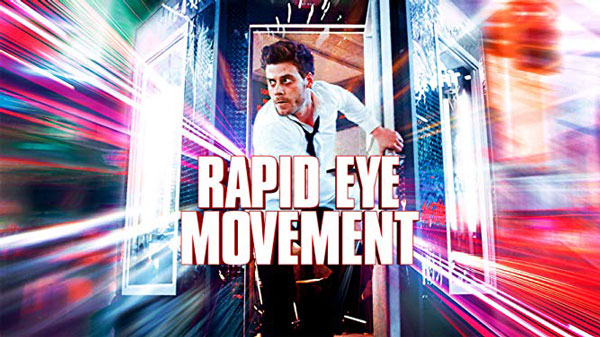
Oh, and no, Avengers: Endgame isn’t one of the year’s best, but it sure gave the audience what it wanted! Over and over again. So that’s something.

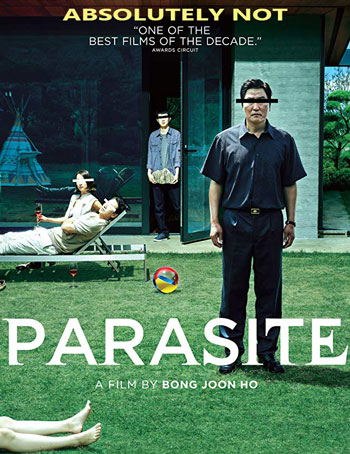
Always enjoy your opinion and recommendations!